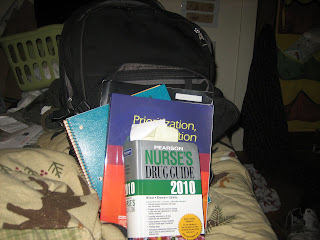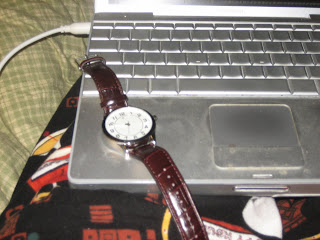 One of the best books I've read in a long time is Bryan Burroughs' "Public Enemies: America's Greatest Crime Wave and the Birth of the FBI, 1933-34." Not only was it, as Time Magazine said, "Ludicrously entertaining," it was fascinating, particularly since so many of the events depicted took place in and around Chicago.
One of the best books I've read in a long time is Bryan Burroughs' "Public Enemies: America's Greatest Crime Wave and the Birth of the FBI, 1933-34." Not only was it, as Time Magazine said, "Ludicrously entertaining," it was fascinating, particularly since so many of the events depicted took place in and around Chicago. In 1933, John Dillinger was living in an apartment at 4310 North Clarendon, about two blocks from where my nursing school is. Dillinger did not know that one of his acquiantences, Art McGinnis, was a paid snitch. When Dillinger developed a scalp problem (either "barber's itch," an inflammation of the hair follicles, or ringworm, a fungal infection of the skin), he sought medical help. McGinnis arranged for Dillinger to visit a doctor on Keeler Avenue, just south of Irving Park Road, this intersection, which is now right by where the Kennedy Expressway crosses Irving Park Road.
In 1933, John Dillinger was living in an apartment at 4310 North Clarendon, about two blocks from where my nursing school is. Dillinger did not know that one of his acquiantences, Art McGinnis, was a paid snitch. When Dillinger developed a scalp problem (either "barber's itch," an inflammation of the hair follicles, or ringworm, a fungal infection of the skin), he sought medical help. McGinnis arranged for Dillinger to visit a doctor on Keeler Avenue, just south of Irving Park Road, this intersection, which is now right by where the Kennedy Expressway crosses Irving Park Road.  Indiana State Police detective Matt Leach was informed. Since Dillinger's escape from an Indiana jail cell, Leach was hot to capture (or kill) Dillinger. Private Detective Forrest Huntington, who worked for one of the banks that Dillinger and his gang had robbed wanted to wait and try to get Dillinger's whole gang. Indiana State Police detective Matt Leach had driven in from Indianapolis, also wanted Dillinger captured or dead that day. Refereeing this all was Chicago Police Lieutenant John Howe, head of the Chicago Police Department's Secret Squad.
Indiana State Police detective Matt Leach was informed. Since Dillinger's escape from an Indiana jail cell, Leach was hot to capture (or kill) Dillinger. Private Detective Forrest Huntington, who worked for one of the banks that Dillinger and his gang had robbed wanted to wait and try to get Dillinger's whole gang. Indiana State Police detective Matt Leach had driven in from Indianapolis, also wanted Dillinger captured or dead that day. Refereeing this all was Chicago Police Lieutenant John Howe, head of the Chicago Police Department's Secret Squad. He argued that Dillinger should pay for the death of Lima, Ohio Sheriff Jess Sarber. Dillinger had engineered a mass escape at a prison in Michigan City, Indiana in order to spring a prison friend, Pete Pierpoint, who had been his mentor in the finer points of bank robbing during the nine-year stint he served for for the ill-conceived grocery store robbery that had imprisoned him to begin with. With the new knowledge he'd gained in prison, he'd started robbing banks, but was fingered for the robbery of a bank in Blufton, Ohio, near Lima. To return the favor for springing him, Pierpoint sprang Dillinger from the Lima jail, murdering Sheriff Sarber in cold blood in the process.
Finally, the "kill or capture" Dillinger contingent won out after a Lima, Ohio officer walked into Lt. Howe's office and pursuaded them that Sheriff Sarber's murder needed to be avenged.
The group, accompanied by three cars of Chicago cops, staked out the offices of Dr. Charles Eye for several hours. At 7:25 PM, Dillinger drove up and parked on Irving Park Road, with his girlfriend Billie Frechette in the car. Dillinger walked into the doctor's office, leaving Frechette in the car. A while later, Dillinger walked out of the physician's office and apparently noticed that several of the cars were parked the wrong way. Sensing danger, Dillinger slipped quickly into the car and warned Frechette to hang on. He floored the car, backing directly into traffic on Irving.
 Several of the various police cars gave chase as Dillinger yelled to Frechette to get down and gunned the car eastbound down Irving Park Road. With Chicago detective John Artery behind the wheel, Indianapolis State Police officer Art Keller started firing wildly, emptying his .38 revolver.
Several of the various police cars gave chase as Dillinger yelled to Frechette to get down and gunned the car eastbound down Irving Park Road. With Chicago detective John Artery behind the wheel, Indianapolis State Police officer Art Keller started firing wildly, emptying his .38 revolver. Dillinger swung south, to the right, at this intersection onto Elston Avenue with Artery continuing to pursue and Keller continuing to fire.
Dillinger swung south, to the right, at this intersection onto Elston Avenue with Artery continuing to pursue and Keller continuing to fire.  The melee continued down Elston until Dillinger pulled into a dead-end street. Artery followed him, but Dillinger rocketed the car in reverse past him and escaped. He and Frechette abandoned the car on the north side of Chicago and took a cab to another gang member's apartment, where an impromptou party was taking place. Dillinger would live to continue his crime spree until his death the next year, on Sunday, July 22, when he was shot to death in front of the Biograph Theater, which still stands today on Lincoln Avenue in Chicago.
The melee continued down Elston until Dillinger pulled into a dead-end street. Artery followed him, but Dillinger rocketed the car in reverse past him and escaped. He and Frechette abandoned the car on the north side of Chicago and took a cab to another gang member's apartment, where an impromptou party was taking place. Dillinger would live to continue his crime spree until his death the next year, on Sunday, July 22, when he was shot to death in front of the Biograph Theater, which still stands today on Lincoln Avenue in Chicago.  Unlike John Dillinger, who avoided killing if at all possible, Lester Gillis, aka "Baby Face Nelson" loved killing. He killed a number of policemen, bank employees, civilians and people who just happened to get in his way. Yet, he was, oddly, a family man, a devoted husband and loving father.
Unlike John Dillinger, who avoided killing if at all possible, Lester Gillis, aka "Baby Face Nelson" loved killing. He killed a number of policemen, bank employees, civilians and people who just happened to get in his way. Yet, he was, oddly, a family man, a devoted husband and loving father. Dillinger worked for a short while with Nelson, but was horrified at Nelson's stupid violence; Nelson would shoot up banks and streets for no reason. The two robbers parted ways.
On April 22, 1934, Nelson gunned down FBI Special Agent W.Carter Baum near Spider Lake, Wisconsin. Despite a massive manhunt, Nelson escaped.
Nelson hid out in Iowa and then California. He was in California when he heard of Dillinger's demise. The psychotic Nelson had always resented that Dillinger was Public Enemy #1 and had a higher bounty on his head, despite the fact that he was much less violent.
In November of that year, the FBI received a tip that Nelson and his wife were scouting out a place near the Illinois-Wisconsin border for a place to hole up for the winter, The FBI prepared to hunt down Nelson in the area. The first two agents two arrive in the area were veteran agent Bill Ryan and rookie Tom McDade. The head of Chicago's FBI office, Samuel Cowley grabbed agent Ed Hollis and also set out for Lake Geneva, Wisconsin.
As they drove toward the Wisconsin border, agents Ryan and McDade had a tip that Nelson was driving a car with Illinois license plate 639578. As they passed through the town Fox River Grove, they passed a black Ford that was barrelling in the other direction. The agents realized it had the plate they were looking for.
As the FBI agents turned their car around, Nelson, also turned his car around. After a series of maneuvers, Nelson's car was pursuing the FBI agents' car!
A wild running gunfight ensued. Nelson's car began losing speed; an FBI shot had hit the engine of his car.
Just then, Sam Cowley and Ed Hollis, in a Hudson sedan, passed by the gunfight. Hollis, driving, did a U-turn. In the meantime, Ryan and McDade had lost Nelson's car. They pulled their car off into a field and lay down, waiting to ambush Nelson.
Seeing Cowley and Hollis approaching, Nelson pulled his dying car off the road and ordered everybody (Nelson's accomplice John Chase and Nelson's wife Helen) out of the car.
Cowley and Hollis did not see Nelson's car until they were almost on top of it. Hollis slammed on the brakes about 150 feet away from where Nelson and Chase were waiting in ambush with rifles.
Nelson and Chase began firing their rifles. Nelson's rifle jammed, and he threw it to Chase, yelling at him to reload it. Nelson grabbed a powerful Thompson submachine gun and began firing it at the two agents. Cowley returned fire with his own Thompson, hitting Nelson in the stomach and chest, shredding his intestines.
Nelson, in pain, but fired up with adrenline, continued firing, hitting Cowley twice, once in the chest, once in the stomach. Hollis jumped out of the car firing a shotgun, hitting Nelson in both legs. Nelson staggered forward, firing at Hollis, who tried to get cover behind a telephone pole. Hollis emptied his shotgun, and then retreated firing his pistol. Nelson fired a volley from his Thompson; one shot hit Hollis in the forehead.
As onlookers from two nearby gas stations looked on in astonishment, Nelson, who it was later discovered was hit 17 times, staggered over to the FBI agents' Hudson and drove it over to his now-dead car. Tossing all the guns he could grab into the Hudson, Nelson let Chase take over the driving.
The first policeman on the scene, Illinois state policeman William Gallagher found Agent Cowley still alive. Hollis insisted that Gallagher help Hollis first. Hollis died before he reached the hospital.
Agent Cowley was picked up by an ambulance shortly thereafter. He was taken to Elgin Hospital, where he was able to report what happened to Agent Melvin Purvis. He died the next day. He is the most senior FBI agent to die in the line of duty.
Chase drove Nelson, who was clearly dying, to the tony northern suburb of Wilmette, Illinois, and took him to the home of a friend of a friend. He died shortly after, in the arms of his wife.
 Chase and Helen Nelson undressed Nelson's body and wrapped it in a blanket, later explaining that Nelson was always complaining about being cold. They dumped the body near here, the gate of St. Peter's Cemetery, in what is now Skokie, Illinois. It was certainly the only gate of St. Peter that the homicidal sociopath was going to get near after his death.
Chase and Helen Nelson undressed Nelson's body and wrapped it in a blanket, later explaining that Nelson was always complaining about being cold. They dumped the body near here, the gate of St. Peter's Cemetery, in what is now Skokie, Illinois. It was certainly the only gate of St. Peter that the homicidal sociopath was going to get near after his death. Richard Lindberg's "Return to the Scene of the Crime: A Guide to Infamous Places in Chicago" was also a valuble resource in writing this post.
















